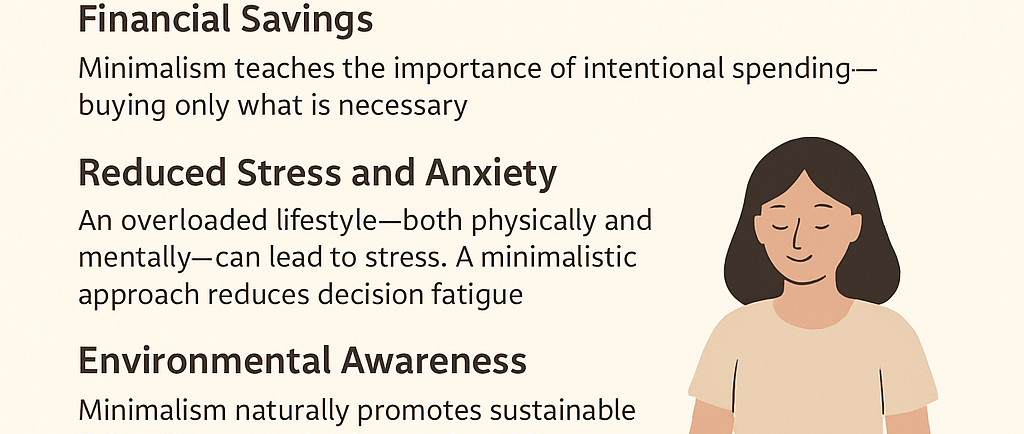The Benefits of Living a Minimalistic Lifestyle for Students


The Benefits of Living a Minimalistic Lifestyle for Students
In a world filled with constant distractions, advertisements, and the pressure to keep up with trends, students often find themselves juggling multiple responsibilities while feeling mentally drained. A minimalistic lifestyle—a conscious decision to live with less but with purpose—can be a powerful approach for students to create balance, focus, and clarity in their lives.
1. Better Focus and Productivity
A cluttered environment often leads to a cluttered mind. Minimalism encourages keeping only what is essential, whether it’s study materials, gadgets, or personal belongings. With fewer distractions in their living and study spaces, students can concentrate better on their academics. Organized surroundings help them prioritize their time and energy toward meaningful tasks, improving productivity and learning outcomes.
2. Financial Savings
Student life often comes with tight budgets. Minimalism teaches the importance of intentional spending—buying only what is necessary and avoiding impulse purchases. This not only saves money but also helps students develop strong financial discipline early in life. The money saved can be redirected toward educational resources, skill development, or future investments.
3. Reduced Stress and Anxiety
An overloaded lifestyle—both physically and mentally—can lead to stress. A minimalistic approach reduces decision fatigue by limiting unnecessary choices, such as “What should I wear today?” or “Which gadget should I use?” With fewer possessions to manage, students spend less time cleaning, organizing, and worrying, which results in a calmer, more peaceful state of mind.
4. Environmental Awareness
Minimalism naturally promotes sustainable living. By consuming less and avoiding unnecessary waste, students contribute to reducing their environmental footprint. Choosing reusable materials, digital notes instead of piles of paper, or buying quality items that last longer aligns with eco-friendly habits, making students more responsible global citizens.
5. More Time for Growth and Experiences
When students aren’t caught in the cycle of accumulating things, they free up time and energy for experiences that truly matter—learning new skills, pursuing hobbies, spending time with friends and family, or engaging in extracurricular activities. These experiences contribute far more to personal growth than material possessions.
6. Stronger Self-Discipline and Values
Minimalism is not just about decluttering possessions; it’s about shaping a mindset that values purpose over excess. Students who practice minimalism learn to set boundaries, prioritize their goals, and resist societal pressure to constantly upgrade or own more. This builds self-discipline—a skill that benefits them not just in academics, but throughout life.
7. Enhanced Mental Clarity
The constant noise of consumerism can cloud judgment and overwhelm the mind. By stripping away the nonessential, students can think more clearly, make better decisions, and stay aligned with their true goals. This mental clarity can be a game changer, especially during exam seasons or critical academic projects.
Conclusion
Minimalism is more than a trend; it’s a lifestyle that offers students the tools to live intentionally, save money, reduce stress, and focus on what truly matters. By embracing “less,” students can gain more—more time, more peace, more purpose, and more growth. In the long run, these habits can lead to a more fulfilling and balanced life, both academically and personally.
